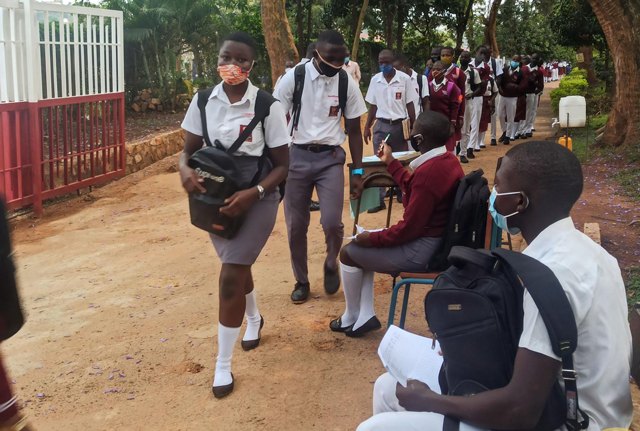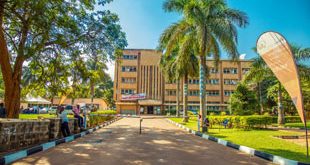
Kampala, Uganda | THE INDEPENDENT | The enforcement of COVID-19 surveillance in primary and secondary schools has been left to teachers. This is according to the school re-opening plan by the Ministry of Education.
When schools reopened in October for candidate and semi-candidate classes last year, the health ministry’s schools re-opening plan depended on teachers implementing the SOPs.
However, mass infections in schools early this year showed that schools stopped implementing the SOPs, leading to infections which subsequently led to the closure of all schools.
As education institutions prepare for the re-opening in January next year, the implementation of the SOPs and disease tracking system will still lie in the hands of teachers.
With the decision to use the MTRAC disease monitoring tool, schools will have to record and manage data of all learners to easily identify sick people. This will require all schools to have a nurse or train a teacher who will be responsible for capturing this data. The data will be captured daily and entered into a national online system.
According to the Ministry of Education, the data of learners, staff and all visitors to the school will be shared and reviewed by health authorities.
However, some public health experts are skeptical about the efficiency of the system. Dr Elizabeth Ekirapa-Kiracho, a senior lecturer and Head of Department Health Policy Planning and Management at the Makerere University School of Public Health, says that what failed surveillance in the first place was leaving the entire system to teachers who selflessly concealed the cases within their schools.
Dr Ekirapa says for surveillance to work this time around, the health ministry will have to play a vital role in the process, or else it will end unsuccessfully.
“When teachers were trusted with the process, we saw what they did. This time around, the ministry of health should have an upper hand in the process. They should set up mechanisms for supervising what is happening in schools. Schools cannot be left on their own to monitor the situation otherwise we shall have similar scenarios and lament,” she said.
During the first reopening, the Ministry of Education guidelines had put in place a chain of protocols enforced by different task forces that were supposed to raise a red flag when a suspected case of coronavirus disease was detected in a school.
Schools that had met all the requirements for reopening were told to form COVID-19 task forces as the internal and first line of defence. The said task forces composed of school management committee members, teachers, and learner’s representatives were charged with filing weekly reports including daily temperature recordings, learners with suspected COVID-19 symptoms, and other normal diseases.
Dr Kedrace Turyagyenda, the Director of Education Standards at the Ministry of Education attributes the past inefficiency to the lack of involvement of school authorities.
Dr Turyagenda however says that this time around they have engaged them and are optimistic that they will understand what to do.
Mike Kironde, the National Chairperson Proprietors of Private Educational Institutions Association in Uganda- PPEIAU, says that schools will certainly conform to the set regulations and report to the authorities using the tools that have been set up.
Dr Ekirapa however cautions that relying on the MTRAC tool alone is not enough. She says using a multi-sectorial approach that involves ministries, parents, local leaders, and school administrators will have better success because there will be follow-up.
“We have to prioritize supervision and allocate some funds so that schools are not left to do this alone. There should be on-spot surveillance and testing to confirm reports made by schools,” she added.
She further added that management of Covid-19 in schools should not be focused on surveillance and treatment alone as other SOPs including social distancing will still be critical.
“Social distance will still be a great issue but we can adopt a system where a section of learners will be attending school or class at different intervals to reduce crowding.”
Although the Ministry of Education is yet to present its revised standard operating procedures that will be followed in schools, the national planning authority has already advised that an alternating model of attendance for day schools be introduced.
*****
URN
 The Independent Uganda: You get the Truth we Pay the Price
The Independent Uganda: You get the Truth we Pay the Price


